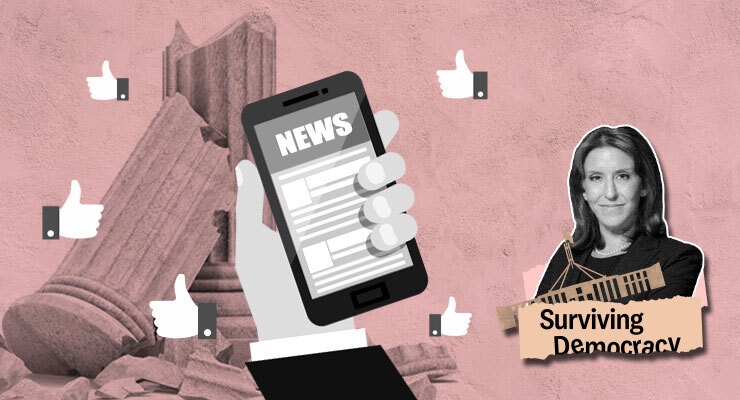
Lindsay Tanner was the first person I heard argue that Australian democracy was on a downhill slide and the media was largely to blame. As he wrote in Sideshow: Dumbing Down Democracy:
After spending much of my life dedicated to the serious craft of politics, I have to admit that I am distressed by what it is becoming. Under siege from commercial pressures and technological innovation, the media … has little tolerance for complex social and economic issues … [and is undermining] the quality of our democracy … from within.
This thesis was — and remains — an easy sell to most Australians. If you don’t work in or near government, the media is your sole portal to what’s being done in your name. No wonder when things get ugly or messy, the messenger gets the blame.
But while I have long argued that Australia’s democracy was unravelling long before the media fell apart, there is no question that there is a problem — a serious problem — in parts of the media, and that without an independent and properly functioning press, democracy cannot survive.
The founders of American democracy understood that, which is why journalism is the only profession the bill of rights explicitly mentions and protects. Even Australia’s notoriously taciturn constitution has been found by the High Court to imply a freedom of political communication that ensures those who speak about politics in ways MPs don’t like can’t be censored or jailed.
The bottom line is that in a democracy voters have to know how those they’ve elected are doing and can’t be expected to rely on those same politicians to tell them.
In other words, if we didn’t have an independent press already we’d have to invent one.
So the press is essential and must be independent from government. But for democracy to thrive, what are the essential characteristics of the information we need it to provide?
Let’s start with shared facts.
The most disturbing aspect of the declining standards of some mainstream media outlets is not just their willingness to broadcast unverified information as fact, but to share what they know — or should know — to be lies. More chillingly, such outlets endorse the Putinesque view that “nothing is true, and everything is possible” — that facts don’t exist, or they might as well not, given we have no trusted means to verify them as real and unbiased.
This meant confusing disagreements about whether a war was actually taking place somewhere, or who won an election in the absence of demonstrable reasons for doubt, just didn’t happen. Sure someone like Roger Stone might have had a crack at confusing things, but he and his ilk couldn’t find each other on Facebook, and back at the news desk editors and fact-checkers did their jobs and filtered the rubbish out.
When this changed at the start of the new millennium, I was among the first to notice. An abortion rights activist at the time, I was appalled at how a pro-life activist schooled in US tactics began selling her ideas under the banner of feminism. How did she do it? By falsely claiming to be a bioethicist to journalists used to scrutinising content for inaccuracies but not credentials and leaving her long pro-life history out.
As she understood then, and we know for certain now, credentials are among the most critical information news consumers use to decide who and what to trust.
While this was the first direct shot at media conventions — conventions that had evolved over more than a century to achieve the interconnected goals of informing the public and maintaining public trust — it wouldn’t be the last. The manipulation of the balance requirement came next, with fringe academics claiming the same amount of real estate in the papers and on radio and TV as scientists representing the overwhelming academic consensus that climate change is dangerous, caused by humans and happening now.
Next week we’ll look at what’s happened, where we are now, and what needs to happen restore an information eco-system conducive to democracy.








If you are an abortion rights activist, how can you call your opponents “pro life”? The title concedes credibility to their self-righteous behaviour. You certainly have arguments that dismiss personhood for a fertilised egg, for example. How about the blunt truth, they are “anti-abortion”?
Exactly!
Hi Roger, great question. I used to call them anti-choice but when they began running their fake pregnancy “counseling” services that their advertising implied provided abortion we needed to call them this to be clear with the public and people that they were fake b/c they were being run by pro-lifers! Our preferred term – anti choicesrs – didn’t resonate with decision makers who we were trying to influence to change the law. In an article that isn’t about abortion but media conventions like credentiallng, this was too much to explain. Thanks for taking the time to read and comment. I appreciate it.
Okay Leslie, I will call them “anti-choice”. That term has the advantage of pointing out the immorality of their stance.
Tanner’s quote ‘…the media … has little tolerance for complex social and economic issues … [and is undermining] the quality of our democracy … from within.’
Of course following the US and UK, but we stand silently while observing LNP, influencers, US linked libertarian think tanks, NewsCorp, 9Fairfax and 7WM; for any outsider it’s a clear right wing nativist libertarian racket but how do we get out of it?
Ms Cannold has written that “This meant confusing disagreements about whether a war was actually taking place somewhere,….did not happen”. I assume this to be a reference to the differing western and Russian narratives on Ukraine.
In 1981, in the USA I was speaking to a young man from the Church of Jesus Christ of Latter Day Saints: An organization founded on a belief in American exceptionalism. He informed me that the USA was chosen by God, and evidenced this sincerely with the fact that the USA had never lost a war. This was 6 short years since the fall of Saigon. He was old enough to remember, so I politely asked the obvious question. He told me that Vietnam was not a war, it was a police action.
If Ms Cannold believes that gross deception in war is a new phenomenon, she is looking in the wrong places. And if she believes that American democracy was founded on truthful reporting, a brief look at the 1800 presidential election (Jefferson v Adams) should set that straight.
One cannot deny there is deceit in our media but I believe it is the nature of the deceit that is the damnation of us. In the last Century my deceased wife’s uncle and mentor was an Editor for one of the Dailies. He was renowned amongst reporters for saying “Facts Sony, Facts.” ie no opinions actual or implied allowed.
He had his faults and one was each day was to read his Horoscope. If his was negative in any shape or form he edited for a more positive outcome before running the printers.
Today whole articles are now written in a similar vein.
“The press is essential and must be independent from government.”
But that won’t solve the problem. News Corp is nominally “independent from government”, but is unquestioningly the propaganda arm of government if its government is in power.
For the statement to be true, is should read: “The press is essential and must be independent from government and the market.” And I say this because, since being persuaded to hand sovereignty over to the ‘market’ in 1980s, we’ve slowly stopped seeing the ‘market’ as an actual human construct, a construct shaped to serve those with the means to shape it.
So, we have private media working in tandem with favoured governments to shape the market to its advantage.
‘Mr potential Prime Minister, allow me to suggest that, if I put the full weight of my communications team behind your message and take it to the people, your subsequent election victory will provide you with the mandate to consolidate my market domination that will serve both of our interests in the longer term.’